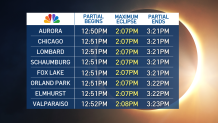One lucky Illinois town is smack dab in the path of totality for the total solar eclipse -- again.
For the 2024 Total Solar Eclipse coming up on Monday, April 8, Carbondale, in Southern Illinois, is in the "centerline" of the path of totality, the state of Illinois said -- just like it was in 2017.
"Southern Illinois is considered the eclipse crossroads of America because it was in the centerline for the path of totality in 2017 and will be again in 2024," according to the Illinois Department of Natural Resources.
At Southern Illinois University Carbondale, the school will host a festival to celebrate the solar event, and classes will be canceled for the day.
"Classes on Eclipse Day (Monday, April 8) will be canceled, but the university will be open. Students will not be in class that day and are encouraged to participate in the exciting events and activities on campus," the school's website reads. "All offices will be open throughout the day but may close for a period during the afternoon so everyone can experience totality."
What time is the solar eclipse in Chicago and Illinois? See peak times across the state
In 2017, nearly 200,000 people witnessed the solar eclipse in southern Illinois, Daniel Thomas, deputy director of the Illinois Department of Commerce and Economic Opportunity, Office of Tourism, said in a press release.
A similar population influx is expected for Monday's event. During the 2024 April 8 Total Solar Eclipse, Carbondale will see four minutes and nine seconds of totality -- which is double what it say in 2017.
"The 2024 solar eclipse will be visible over approximately 128 miles of Illinois April 8," the Illinois Department of Transportation said in a post. "Totality enters Illinois as it crosses the Missouri state line southwest in Carbondale at 1:58 p.m. The eclipse will follow a diagonal line crossing over Fairfield and exit Illinois at Mount Carmel at 2:06 p.m."
There are also 31 state parks that will be in eclipse's path of totality, officials said.
Feeling out of the loop? We'll catch you up on the Chicago news you need to know. Sign up for the weekly Chicago Catch-Up newsletter.
For those heading to southern Illinois to see the eclipse, the following tourist destinations are some of the places to stop along the way, according to the state's tourism website.
- Kaskaskia Dragon, Vandalia
- Big Things, Casey
- Superman Statue & Museum, Metropolis
- Fort Massac Encampment, Metropolis
- Walker's Bluff Casino & Resort, Carterville
Additionally, the following local state parks offer a picturesque setting for a nature walk on the day of the eclipse.
- Starved Rock State Park, Utica
- Matthiessen State Park, Utica
- Pere Marquette State Park, Grafton
- LaRue Pine Hills, Wolf Lake
In Northern Illinois, the Chicago area expects to see an estimated 94% totality.
"Even though it’s a partial eclipse over Chicago, the skies are still going to get darker, with more than 90% of the sun getting covered," NBC 5 Meteorologist Kevin Jeanes said. In the eclipse's path of totality, skies were expected to get "much darker," Jeanes said.
Solar Eclipse Interactive Map
13 states and countless cities are in the solar eclipse's path of totality. Here's a full interactive map that shows where the eclipse will be and when.
When will the eclipse be over Illinois and Chicago?
Here's a city-by-city breakdown of what to expect and when, according to NBC Chicago and Time and Date.

Aurora
Partial eclipse begins: 12:50:22
Maximum eclipse: 14:06:37
Partial eclipse ends: 15:21:07
Chicago
Partial eclipse begins: 12:51:28
Maximum eclipse: 14:07:41
Partial eclipse ends: 15:22:02
DeKalb
Partial eclipse begins: 12:50:03
Maximum eclipse: 14:06:09
Partial eclipse ends: 15:20:36
Evanston
Partial eclipse begins: 12:51:38
Maximum eclipse: 14:07:45
Partial eclipse ends: 15:22:00
Fox Lake
Partial eclipse begins: 12:51:29
Maximum eclipse: 14:07:20
Partial eclipse ends: 15:21:26
Lombard
Partial eclipse begins: 12:50:57
Maximum eclipse: 14:07:09
Partial eclipse ends: 15:21:33
Orland Park
Partial eclipse begins: 12:50:48
Maximum eclipse: 14:07:10
Partial eclipse ends: 15:21:42
Plainfield
Partial eclipse begins: 12:50:19
Maximum eclipse: 14:06:39
Partial eclipse ends: 15:21:14
Schaumburg
Partial eclipse begins: 12:51:05
Maximum eclipse: 14:07:10
Partial eclipse ends: 15:21:29
Wheaton
Partial eclipse begins: 12:50:48
Maximum eclipse: 14:07:00
Partial eclipse ends: 15:21:25
(Check your city here)
For those looking to be in the path of totality, here's a list of Illinois cities that fall in that category, according to the Illinois DNR:
Carbondale
Totality begins: 13:59:15
Maximum eclipse: 14:01:20
Totality ends: 14:03:25
Makanda
Totality begins: 13:59:09
Maximum eclipse: 14:01:14
Totality ends: 14:03:19
Alto Pass
Totality begins: 13:58:56
Maximum eclipse: 14:01:01
Totality ends: 14:03:06
Fairfield
Totality begins: 14:01:19
Maximum eclipse: 14:03:21
Totality ends: 14:05:23
Olney
Totality begins: 14:02:12
Maximum eclipse: 14:04:07
Totality ends: 14:06:03
Golconda
Totality begins: 14:00:39
Maximum eclipse: 14:02:04
Totality ends: 14:03:30
Effingham
Totality begins: 14:03:25
Maximum eclipse: 14:03:49
Totality ends: 14:04:13
Mt. Vernon
Totality begins: 14:00:35
Maximum eclipse: 14:02:28
Totality ends: 14:04:20
Marion
Totality begins: 14:01:53
Maximum eclipse: 14:03:54
Totality ends: 14:05:56

